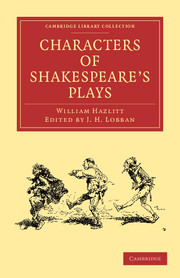Book contents
- Frontmatter
- Preface
- Contents
- Introduction
- Preface
- Cymbeline
- Macbeth
- Julius Cæsar
- Othello
- Timon of Athens
- Coriolanus
- Troilus and Cressida
- Antony and Cleopatra
- Hamlet
- The Tempest
- The Midsummer Night's Dream
- Romeo and Juliet
- Lear
- Richard II
- Henry IV
- Henry V
- Henry VI
- Richard III
- Henry VIII
- King John
- Twelfth Night; or, what you will
- The Two Gentlemen of Verona
- The Merchant of Venice
- The Winter's Tale
- All's Well That Ends Well
- Love's Labour's Lost
- Much Ado About Nothing
- As You Like It
- The Taming of the Shrew
- Measure for Measure
- The Merry Wives of Windsor
- The Comedy of Errors
- Doubtful plays of Shakespear
- Poems and Sonnets
- Notes
The Winter's Tale
Published online by Cambridge University Press: 07 September 2010
- Frontmatter
- Preface
- Contents
- Introduction
- Preface
- Cymbeline
- Macbeth
- Julius Cæsar
- Othello
- Timon of Athens
- Coriolanus
- Troilus and Cressida
- Antony and Cleopatra
- Hamlet
- The Tempest
- The Midsummer Night's Dream
- Romeo and Juliet
- Lear
- Richard II
- Henry IV
- Henry V
- Henry VI
- Richard III
- Henry VIII
- King John
- Twelfth Night; or, what you will
- The Two Gentlemen of Verona
- The Merchant of Venice
- The Winter's Tale
- All's Well That Ends Well
- Love's Labour's Lost
- Much Ado About Nothing
- As You Like It
- The Taming of the Shrew
- Measure for Measure
- The Merry Wives of Windsor
- The Comedy of Errors
- Doubtful plays of Shakespear
- Poems and Sonnets
- Notes
Summary
We wonder that Mr Pope should have entertained doubts of the genuineness of this play. He was, we suppose, shocked (as a certain critic suggests) at the Chorus, Time, leaping over sixteen years with his crutch between the third and fourth act, and at Antigonus's landing with the infant Perdita on the sea-coast of Bohemia. These slips or blemishes however do not prove it not to be Shakespear's; for he was as likely to fall into them as anybody; but we do not know any body but himself who could produce the beauties. The stuff of which the tragic passion is composed, the romantic sweetness, the comic humour, are evidently his. Even the crabbed and tortuous style of the speeches of Leontes, reasoning on his own jealousy, beset with doubts and fears, and entangled more and more in the thorny labyrinth, bears every mark of Shakespear's peculiar manner of conveying the painful struggle of different thoughts and feelings, labouring for utterance, and almost strangled in the birth. For instance:–
“Ha’ not you seen, Camillo?
(But that's past doubt ; you have, or your eye-glass
Is thicker than a cuckold's horn) or heard,
(For to a vision so apparent, rumour
Cannot be mute) or thought (for cogitation
Resides not within man that does not think it)
My wife is slippery? If thou wilt, confess,
Or else be impudently negative,
To have nor eyes, nor ears, nor thought.”–
- Type
- Chapter
- Information
- Characters of Shakespeare's Plays , pp. 208 - 214Publisher: Cambridge University PressPrint publication year: 2009First published in: 1908

